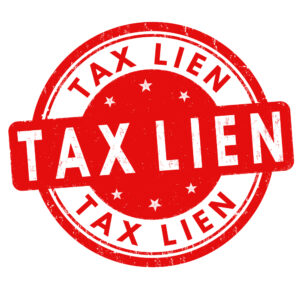ARE TAX LIENS PUBLIC INFORMATION?
 Yes, a tax lien on a company is a public record. This means that anyone can search for and view the lien, including potential creditors, investors, and the general public. The lien will typically be filed with the county recorder’s office in the county where the company is located.
Yes, a tax lien on a company is a public record. This means that anyone can search for and view the lien, including potential creditors, investors, and the general public. The lien will typically be filed with the county recorder’s office in the county where the company is located.
WHAT IS THE PURPOSE OF A TAX LIEN?
 The purpose of a tax lien is to give the government a legal claim on the company’s assets if the company fails to pay its taxes. The lien will remain in effect until the taxes are paid in full.
The purpose of a tax lien is to give the government a legal claim on the company’s assets if the company fails to pay its taxes. The lien will remain in effect until the taxes are paid in full.
There are a few exceptions to the rule that tax liens are public records. For example, if the lien is filed against a company that is in bankruptcy, the lien may be sealed. This means that the lien will not be available to the public.
Cops & Detectives can use this readily-available information to find out if a suspect is having money problems, or if he has suspicious business practices.
HOW TO FIND TAX LIEN INFORMATION:
 If you are interested in finding out if a company has a tax lien, you can search the public records for the county where the company is located. You can also contact the Internal Revenue Service (IRS) to see if they have a lien on the company.
If you are interested in finding out if a company has a tax lien, you can search the public records for the county where the company is located. You can also contact the Internal Revenue Service (IRS) to see if they have a lien on the company.
Since this is writer’s information, you can see what information a detective can get and where he can get it.
WHY WOULD THE POLICE WANT TO KNOW ABOUT TAX LIENS?
 Here are some of the reasons why someone (or a detective) might want to know if a company has a tax lien:
Here are some of the reasons why someone (or a detective) might want to know if a company has a tax lien:
- To determine if the company is financially stable.
- To assess the company’s risk as a potential creditor or investor.
- To protect their own assets from being seized to satisfy the tax lien.When writing a plot line, you may also want to know:
- What is the suspect’s or his/her company’s financial situation? Is this part of the motive?
- What are the company’s assets? Is a suspect’s money all tied up in business assets?
- Who are the company’s creditors and investors? Could one of them be a suspect?
HERE IS A LIST OF SOME OTHER TERMINOLOGY SURROUNDING A TAX LIEN:
 Sometimes just having an overview of how things work can help you thicken the plot or add some details that will enrich the story. Below are some words and definitions that surround the subject of Tax Liens:
Sometimes just having an overview of how things work can help you thicken the plot or add some details that will enrich the story. Below are some words and definitions that surround the subject of Tax Liens:
- Tax lien: A legal claim against a taxpayer’s property for unpaid taxes. A tax lien gives the government the right to seize and sell the property to satisfy the debt.
- Levy: The act of seizing property to satisfy a debt. In the case of a tax lien, the government can levy on any property owned by the taxpayer, including real estate, personal property, and bank accounts.
- Notice of lien: A document that is filed with the public records to notify creditors and other interested parties that a tax lien has been filed against a taxpayer’s property.
- Lienholder: The person or entity that holds a lien on property. In the case of a tax lien, the lienholder is the government.
- Redemption: The right of a taxpayer to pay off a tax lien and regain ownership of the property that was seized.
- Statutory redemption: A type of redemption that is available to taxpayers under state law. Statutory redemption typically allows taxpayers to redeem property within a certain period of time after the lien was filed.
- Judgment lien: A lien that is placed on property to satisfy a court judgment. Judgment liens can be filed by creditors who have won a lawsuit against a debtor.
- Encumbrance: A legal claim against property that affects its ownership or use. Encumbrances can include tax liens, mortgages, and easements.
- Lien priority: The order in which liens are satisfied when property is sold. Tax liens typically have the highest lien priority, meaning that they are paid off first.





